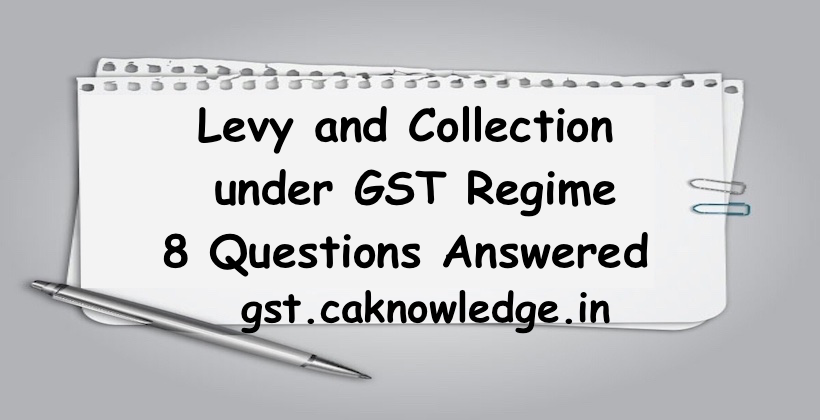Levy and Collection under GST Regime
Q1. What are the taxes that are levied on an intra-State supply?
Ans. In terms of Section 9 of the CGST Act, 2017, intra-State supplies are liable to CGST & SGST. In terms of Section 7 of UTGST Act, 2017, intra-State supplies effected by a taxable person located in Union Territory (within the Union Territory) will be liable to CGST & UTGST.
Q2. How to ascertain the taxable value for levy of CGST & SGST/UTGST?
Ans. Section 15 of the CGST Act, 2017 specifies that the value of supply of goods or services or both shall be the transaction value, which is the price actually paid or payable for the said supply of goods or services or both where the supplier and the recipient of the supply are not related and the price is the sole consideration for the supply. Further Section 15 provides for certain inclusions which will form part of the value viz., incidental expenses, commission, interest, penalty etc. In cases where the supplier and recipient are related persons or where the price is not the sole consideration, the provisions and method for ascertaining the value of taxable supply as prescribed in valuation rules shall apply..
Q3. What is the rate of tax that is applicable on intra-State supplies?
Ans. The applicable rate of tax is yet to be notified. However, the provisions specifies that the Central/State Government may specify rate of tax not exceeding 20%.
Q4. Who is responsible to pay taxes?
Ans. Generally, the person effecting taxable supplies is liable to pay taxes. However, following are certain exceptions:
(a) Reverse charge: Supply of goods or services or both, as may be notified by the Government on the recommendations of the Council, the tax on which shall be paid by the recipient under reverse charge; and(b) E-Commerce: Categories of services as may be notified by the Government on the recommendation of Council the tax on which shall be paid by the electronic commerce operator if such services are supplied through it
Q5. What does the payment of tax under reverse charge mean?
Ans. In terms of Section 2(98), the terms reverse charge is defined to mean liability to pay tax by the recipient of supply of goods or services or both instead of the supplier of such goods or services or both.
Q6. What are the different types of supplies which are liable to tax under reverse charge mechanism?
Ans. As per Section 9 of the CGST Act, 2017 there are two types of supplies which are liable to tax under reverse charge mechanism which are:-.
- Specified categories of supply of goods or services or both as notified by government on recommendation of the council2. Supply of taxable goods or services or both by an unregistered supplier to a registered person
Q7. Whether the tax on intra-State supplies is applicable to every supplies?
Ans. No. Section 9(1) which is the charging provision for levy and collection of tax on intraState supplies excludes supply of alcoholic liquor for human consumption. Further, in terms of Section 9(2), tax on supply of petroleum crude, high speed diesel, motor spirit, natural gas and aviation turbine fuel shall be levied with effect from such date as may be notified by the Government on the recommendations of the Council. Accordingly, supply of alcoholic liquor for human consumption is not liable to tax under CGST Act, 2017.
Q8. Whether CGST & SGST/UTGST is applicable on import of goods or service or both?
Ans. In terms of Section 7 of the IGST Act, 2017, import of goods or services or both is shall be treated to be a supply in the course of inter-State trade or commerce. Accordingly, tax under the provisions of IGST Act, 2017 (IGST) shall apply on import of goods or services or both. Recommended Articles
GST ScopeGST ReturnGST FormsGST RateGST RegistrationWhat is GST?GST Invoice FormatGST Composition SchemeHSN CodeGST LoginGST RulesGST StatusTrack GST ARNTime of Supply
